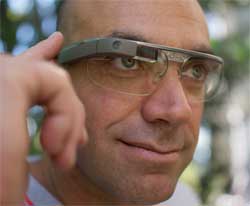SAN FRANCISCO, USA: Google's internet-linked eyewear - hotly anticipated by some, feared by others - is now available to anyone in the United States with $1,500 to spare and a yen to become an "explorer."

Google has opened its beta program for the Glass device to anyone willing to buy the device for US$1,500. Image: Wikipedia
The decision to open the "Glass" test, or beta, program to anyone with enough money and curiosity came about a month after a one-day sale of the eyewear to the public.
"We learned a lot when we opened our site a few weeks ago, so we've decided to move to a more open beta," said a post on the Glass page at Google+ online social network.
"We're still in the Explorer Program while we continue to improve our hardware and software, but anyone in the US can buy the Glass Explorer Edition, as long as we have it on hand," Google said.
In a possible sign of interest in the eyewear, the Glass page on the Google+ network has more than 678,000 followers and has been viewed more than 107 million times.
Google said in March it is joining forces with the frame company behind Ray-Ban and other high-end brands to create and sell Glass Internet-linked eyewear in the United States.
Partnership with Luxottica
The partnership with Luxottica was portrayed as Google's biggest step yet into the emerging smart eyewear market.
Luxottica brands include Oakley, Alain Mikli, Ray-Ban and Vogue-Eyewear. The first smart glasses by Luxottica for Google Glass will go on sale in 2015, the head of the Italian eyewear group said.
Google has been working to burnish the image of Glass, which has triggered concerns about privacy since the devices are capable of capturing pictures and video.
Google recently sent out a release to debunk what it claims are myths about Glass such as the ideas that it invades privacy, distracts wearers and is for "technology-worshipping geeks."
"If someone wants to secretly record you, there are much, much better cameras out there than one you wear conspicuously on your face and that lights up every time you give a voice command, or press a button," Google said.
During the Explorer testing phase, developers are creating apps for Google Glass, which range from getting weather reports to sharing videos or playing games.
In February Google recommended that early adopters should not be "Glassholes" as part of its code of conduct recommendations posted online for the software developers and others taking part in the "explorer" program.
Google appeared intent on avoiding the kinds of caustic run-ins that have seen some Glass wearers tossed from eateries, pubs or other establishments because of concerns over camera capabilities built into devices.
Glass connects to the Internet using Wi-Fi hot spots or, more typically, by being wirelessly tethered to mobile phones. Pictures or videos may be shared through the Google Plus social network.
Source: AFP via I-Net Bridge















